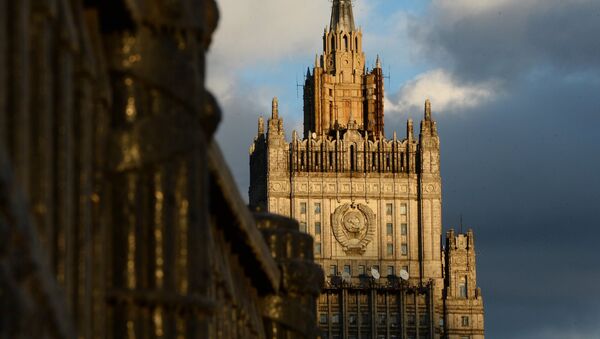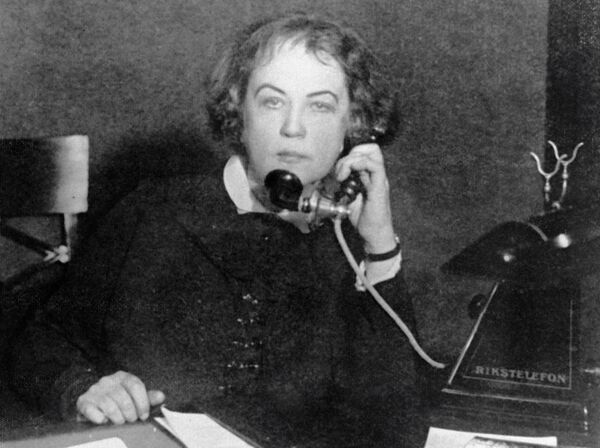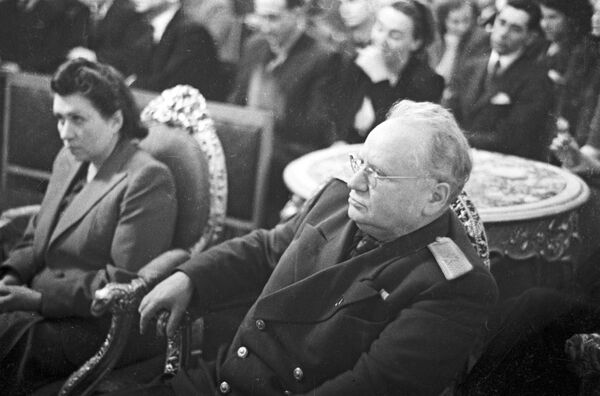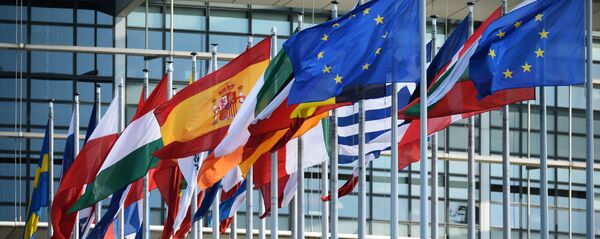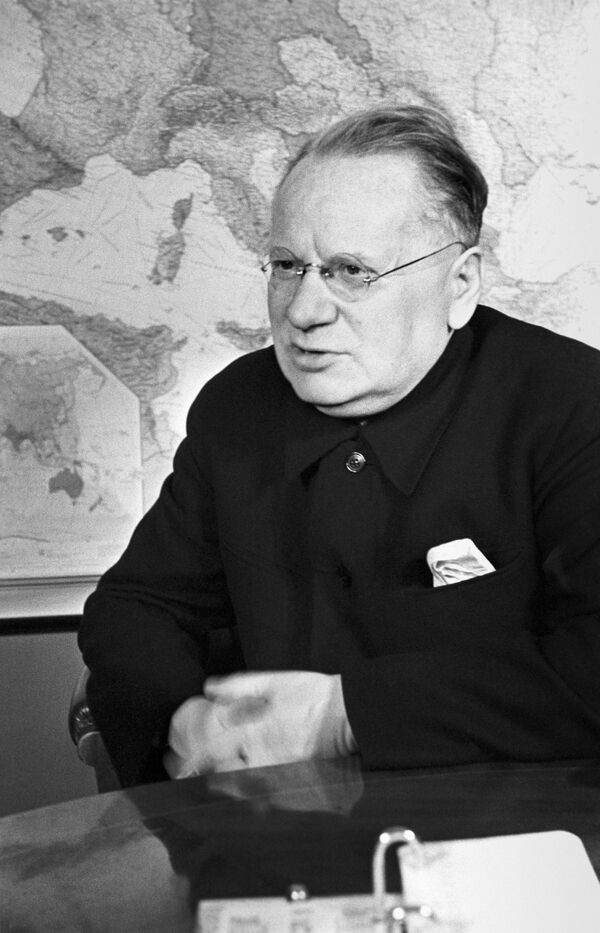Canadian historian and the author of the book, Michael Jabara Carley, has shed light on early Soviet diplomacy and the reasons for his interest in this subject.
Sputnik: Why did you choose this particular period of Soviet diplomacy for your research? Was it just a scientific interest or something personal?
Michael Jabara Carley: This is complicated question. The first book that I wrote, the first monograph was on the French intervention, military, political, economic intervention in Russia after the Bolshevik Revolution in November of 1917. And after I finished with that subject, I just got interested in the 1920s. I wanted to continue going forward in time and basically that's how it started. I formed a partnership with another colleague in Canada, Richard K. Debo, he was interested in Soviet foreign policy and we decided to write a book together on the 1920s. We applied for a research grant from the Social Sciences and Humanities Research Council of Canada. And we got our grants. And I went to Paris, London, Washington, Moscow. He went to London, Bonn and Potsdam. And we gathered a lot of research. Unfortunately, he fell seriously ill and fell out of the project and I went ahead with it by myself.
Sputnik: Michael, you've started the research in Paris in 1987. Did you manage to talk to diplomats who worked at the time?
Michael Jabara Carley: You mean who? Who were still alive for the period?
Sputnik: Yeah.
Michael Jabara Carley: No, I didn't. I think they were all dead by the time.
Sputnik: And how did you get access to exclusive archives, what facts impressed you the most?
Michael Jabara Carley: Well, which archives are we talking about? French, British, American, Russian?
Sputnik: Well, all of them.
Michael Jabara Carley: Well, some archives are easier to get access to than others. The French archives, once they were open, anybody who was judged qualified could go in and consult inventories and request files. It was same in Great Britain and in the United States, the only place where it's difficult to, let's say more difficult to function, is here in Moscow at the foreign ministry archives. It's a little bit more difficult to have access there.
Sputnik: You've also used Western archives for your research, and how was the Soviet foreign policy represented in these sources?
Michael Jabara Carley: Very negatively. What can I say, the foreign intervention? After the Bolshevik seizure of power in 1917, all the Western powers could think about was destroying the Bolsheviks and hanging them all from light posts between Moscow and Piter. They sent military forces to various places in Soviet Russia and they tried to crush the Soviet government. Only they didn't succeed. So their attitude was exceedingly hostile and continued to be so even after the defeat of the foreign interventionist by the Red Army, which was led, as you might know, by Trotsky.
Sputnik: And why were they so concerned about the Bolshevik government? I mean, was it the human rights concerns or what?
Michael Jabara Carley: What happened after the Bolsheviks seized power was that they nationalized private property. They nationalized banks and industries and they canceled the tsarist state debt. And this in France alone represented the enormous sum of 11 billion gold francs. So if you're a member of the French bourgeoisie, the middle class, and you bought tsarist bonds on which to retire, on the interest of those bonds. And suddenly they're not there, you wouldn't be too happy. And you put pressure on the government to do something about it. Do something, please. And, of course, the French government in principle was outraged that they said to them, they said, who the hell are these people? How dare they nationalize banks? How dare they? They abolished the tsar’s state debt. They're violating all our capitalist principles. We can't tolerate this. Imagine if you were a bank manager and somebody buys a mortgage from you and then doesn't pay. That's basically what the attitude was.
Sputnik: What facts impressed you the most?
Michael Jabara Carley: How about if I answer your question this way, OK? What's most interesting to me is comparing various perspectives represented in these archives, particularly I'll speak of U.S. and British and French archives as the Western archives and then compare them with the outlook represented in the Soviet archives. And the differences are sometimes quite remarkable. Most people won't know this, but Soviet diplomats of the first generation were really very good at their job. They were well educated. They weren't uneducated workers. They were doctors, engineers, lawyers, schoolteachers, historians. They were polyglot, multilingual. Speaking German, English, French, perhaps other languages. They were highly sophisticated people. And they were very pragmatic. And, you know, at the end of the intervention period Soviet Russia was ruined. After eight years of war, civil war and foreign intervention, the country was functioning at about 15 percent of industrial capacity in 1914.
Сommerce between the cities and the countryside had broken down: money, paper money, was worthless. The Soviet government was desperate to renew relations with the West in order to trade, in order to revive the Soviet economy. And so necessity makes people very pragmatic. And these diplomats were extremely skilled and pragmatic and made the case to the West that we should forget the past and try to build towards the future and at least establish correct and mutually profitable relations. That was basically the view of the Soviet side. But the western side wasn't really buying that. They were on principle outraged by socialism in Russia. They were outraged by the fact that the Soviet government had abolished private property and so forth and so on. These were fundamental principles of capitalist civilization. And they were not prepared to accept that the Soviet government could do this and get away with it. But on the other hand, there was pressure from industrialists who needed to fill their order books. And Russia seemed like an extraordinary market.
And so there was pressure on governments to let businessmen make deals with the Soviet government and to acquire credit in order to finance them. If it had been up to the United States, for example, they would have demanded that all trade be made on a cash and carry basis with the idea that they would eventually bankrupt the Soviet government, its gold and foreign currency holdings. And at that point, the Soviet government would be at the mercy of the West. That was the American plan at the outset and didn't work.
Sputnik: How would you assess the ideas and activities of the first generation of Soviet diplomats and their relations with Western countries?
Michael Jabara Carley: Like I said, they were extremely skillful and pragmatic people. And what's surprising about them is that they managed to establish remarkable relationships with all manner of Western politicians, people in government, journalists, industrialists and so forth and so on. Remarkable, constructive relations. And they recorded the facts of these relations, their meetings with them and so forth and so on in regular reports that they sent to Moscow. And so we know a lot about these relations from the Soviet archives. Things we can't find out from Western archives because Western counterparts didn't keep records. So what we know, we know from the Soviet files. I often say to students who are interested in, say, French history during the war years, I often tell them, well, if you really want to dig into French history and the inter waryears, you need to learn to read Russian and and go to Moscow to read the archives in the Russian foreign ministry.
Sputnik: What were the challenges in forming diplomatic relationships with other countries in those days? What did diplomats have to face?
Michael Jabara Carley: Basically, they had to face intense hostility from the West. You know that the first images of the Bolsheviks were of dirty, stinking people with broken teeth and the blood of innocent victims dripping from the corners of the mouths of these monstrous Bolsheviks. Sometimes they had bloody daggers in their teeth. Other representations show them with a bomb in one hand and a knife in the other, dripping with the blood of innocent bourgeois citizens. Those are pretty ugly images. And these images persisted through the interwar years and sometimes Soviet diplomats were roughed up. Occasionally they were assassinated. They had a hard time. They really did. And they were brave. They were brave people to put up with it. And they somehow or the other they persisted. They were not intimidated. They did their job and sometimes they succeeded and sometimes they didn't.
Sputnik: How did the Western governmental elites react to the USSR foreign policy?
Michael Jabara Carley: That depends on what period you're talking about. But often they misinterpreted it. They saw the Soviet Union as an aggressive purveyor of communist and socialist revolution, which was at the beginning, was partially true. There were conflicts between practical Soviet diplomats and revolutionary members of the Communist International. That was the Komintern which was formed in 1919. As I say, their job was exceedingly difficult and they managed to persevere. But, you know, that's the first 10 years, in the 1920s, and the second 10 years, that's the 1930s. As you know, Adolf Hitler came to power in January 1933, and the Soviet side very rapidly saw the danger of Hitler and proposed talks with the Western powers based on collective security and mutual assistance to recreate in effect the World War one anti German entente composed of the United States, France, Britain and even fascist Italy. And that strategy of the Soviet side, which their diplomats pursued for about six years, obviously, it was not successful.
Sputnik: If we speak about the first part of the 20th century, how did relations between the West and the USSR develop given the European diplomatic and economic sanctions in the 1920s?
Michael Jabara Carley: You know that I propose to my students that the Cold War began in 1917 and there was a “truce” between 1941 and 1945 during the Great Patriotic War and the establishment of the Grand Alliance and then a resumption of the Cold War in 1945. So the Soviet side was always up against what one Soviet ambassador called in 1930 Sovietophobia and anticommunism. And these obstacles could not be overcome. And in spite of all the efforts of the Soviet government during the 1930s to establish this anti-German entente against Hitlerite Germanythey didn't succeed.
. I'm writing a new book on the 1930s to follow the one that was recently published in Russian, on the 1920s, and it's very clear from the archives, Soviet, French, British, for example, and American, that there was insurmountable hostility which basically prevented the establishment of this anti-Nazi entente with the Soviet Union. It was basically, you know, I say to my students - governing elites in Europe were very conservative and very afraid of socialism, very afraid of communism, and their fear of communism was greater than their fear of Nazi Germany. The great question of the 1930s was “who is enemy number one? Nazi Germany or the Soviet Union?” And very often, all too often, members of the governing elites in Europe came up with the wrong answer. It was as though they saw red and turned yellow.
Sputnik: Even after Hitler came to power?
Michael Jabara Carley: Even after Hitler came to power, and this is going to shock youperhaps, but conservative elites in Europe actually were very favorable to Nazism. They were very favorable to Hitler, I think of the Canadian Prime Minister, Mackenzie King. He thought Hitler was a remarkable man. A large portion of the British elite, too, not all to be sure but a large portion, was of a like mind. You know, the thing about fascism was that it was perceived by conservative elites as a bulwark mounted in defence of capitalism against the menace of socialism and communism.
Fascists represented force, power and masculinity, and this especially impressed males of the governing elites who weren't so sure about their masculinity and were not so sure of their power. And when they saw these Nazi parades with the drums and the flags and the torchlights at night, this created, you know, wow. This is really – wow, this is power. It was like an aphrodisiac for elite men unsure of their own virility. You might think it's funny or maybe some people who might be listening to us might think Professor Carley is exaggerating, alright perhaps I am a little, to make a point.
Sputnik: I'm smiling here because I'm wondering if they thought that Nazis represented power and what about communism? How did it look? In their view?
Michael Jabara Carley: Terrifying. Imagine if you have a nice house in London, another house in the countryside, a large bank account, and the communists, socialists take power in Britain, you might lose all those things. It was as simple as that for some people. They weren't prepared to tolerate socialism. They weren't prepared to tolerate the danger of their wealth and property being taken away from them. And they saw the Soviet Union as a threat in that respect. Especially influencing working classes in Europe. The Communist Party in France became very powerful in 1930s, the Communist Party in Germany was quite strong before it was repressed by Hitler. You know, there was some danger for elites and they looked at the Soviet Union as a hotbed of, shall I say, danger towards their political and economic interests.
Sputnik: Can we draw any parallels between the current stance of diplomatic relationship of Russia and the Western countries with the situation back in 20s? What are the similarities and differences?
Michael Jabara Carley: Well, the biggest difference is that Soviet Union doesn't exist anymore. That's the biggest difference. But what's similar is, a deep hostility of the West towards Russia. Russophobia, it was very intense in the 1920s and it's intense now to the point where it's become absurd, absurd. And then the Western powers in 1920s used the same tools that the Western powers are using now in order to, in the 1920s hurt the Soviet Union, now to hurt the Russian Federation. I'm thinking of economic sanctions of various sorts which are intended to sabotage the Russian economy. The Soviet economy in 1920s and now the Russian economy. They didn't work all that well in the 1920s and they don't appear to be working all that well now. But the red thread, if you want the common point of relations in the 1920s and now is this intense hostility toward Russia. It's in some ways, well, it's incomprehensible.
Sputnik: Back then they were concerned with private property. What are they afraid of now? It's an open country.
Michael Jabara Carley: You know, that is exactly the question I ask. What the hell are they afraid of? You know, President Putin, when he came to power, he was an Atlanticist. He talked about an economic market from Lisbon to Vladivostok. You know, more trade, more this, more that with Europe. He wanted to integrate Russia with Europe without of course sacrificing Russia's independence. He wanted integration. He wanted to get along. His policy was that of an Atlanticist. And he tried to push that when, you know, after 9/11 and the Americans went in to Afghanistan. He was one of the first heads of state to offer assistance to the United States. “Come on, let's get along. We have important common interests. That's what he says. That's still his line. Let's get along. What's the problem? And he gets nowhere.
I think President Putin is a frustrated Atlanticist, he's forced to take positions that he doesn't really want to take, but he doesn't have any choice. I mean, NATO, for example, promised not to push up against Russian borders. You know, at the time when the Berlin Wall fell and Germany was reunited. Oh, sure. We're not going to push NATO towards your borders. Not to worry. That was the line they gave to Gorbachev. Germans, Americans and so forth and so on. But they didn't keep their word. And now we have we have NATO troops conducting military exercises a hundred and sixty kilometers from Petersburg. You know, it's just, from a Russian point of view, it's not acceptable. And the West hasn't kept its bargain with Russia. You know, some say that the West just cannot tolerate a strong Russia. They cannot tolerate an independent, strong, self-confident Russian nation. That's their problem. And if that's their problem, it's going to be their problem for a long time. Because I don't think Russians are prepared to be a vassal state of the Western great powers. But, as I say, that's the west’s problem.
Sputnik: Is it a unanimous opinion? I mean, back then it was mainly the United States who was pushing the narrative, anti-Russian narrative, but now we're witnessing Europe. European partners like Italy, French President Emmanuelle Macron stressed the importance of cooperation with Moscow. So we're witnessing a discord between the West on Russia?
Michael Jabara Carley: I think once economic sanctions were imposed on Russia after the Maidan coup d’état and they were allowed to run for two, three years, certain European powers understood that they were being hurt more than Russia was being hurt and they were paying a higher price for sanctionsthan the United States. The United States wasn't paying a price. They were paying the price of an American led policy. And some European leaders aren't stupid and could read their national balance sheets and they said, hey, this is working against us. We need to stop it. But every time the issue of sanctions comes up in the European Union, it's always the same. They all vote for continuation, whether they think it's a good idea or not. And you have to assume that they are simply at this point anyway, afraid or unprepared to break away from American policy.
Sputnik: I know it's hard to make forecasts in this day, but how do you think relations will develop further? Is will there be a light in the end of the tunnel?
Michael Jabara Carley: Well, sometimes my students ask me that. What I say is this. If you look at the last one hundred years of Soviet/Russian relations with the west, except for the period of the Great Patriotic War, during the ”truce” as some of my students like to call it. between the United States, Great Britain and the Soviet Union… except for those four years, these relations have been tense and hostile. And if you think to yourself, well, these relations have been bad for 100 years, it probably means that they are not going to improve any time soon.
Sputnik: I cannot help but ask you about President Donald Trump and the upcoming impeachment… What is your forecast?
Michael Jabara Carley: I'm a historian. I don't make forecasts about the future. But I will say this, that I think these charges that the Democrats in the House of Representatives are proposing as the basis of formal impeachment proceedings against President Trump are bogus and simply a political weapon in order to weaken Trump because they fear that he may win reelection. And realistically, I don't see, at least at this point anyway, I don't see the Republicans who control the Senate voting to oust President Trump, which would go against their interests. This is a strict party line issue. And Democrats are trying to harm a Republican president because they think he may win the 2020 elections. It seems as simple as that to me. But then I'm not an expert on American domestic policy. I have to say that.
Sputnik: Coming back to anti Soviet hysteria, how did Western press portray the Soviet Union at that time?
Michael Jabara Carley: Well, as I say, the classic images of the Bolshevik represented in political cartoons and in political posters were of the dirty, stinking, foul looking Bolshevik with the with the blood of his victims dripping from the corners of his mouth with a dagger in his teeth or his broken teeth or with a dagger in one hand and a smoking bomb in the other. There are other images of them as zombies, gorillas, monsters of various kinds, and they're always killing the innocents of capitalist “civilization”. And these sorts of representations of Bolsheviks have continued for a long time, although after 1945 there was a focus on Stalin as a troublemaker and an aggressor. For me, it's a lot like pot calling the kettle black or Satan rebuking sin because often the aggressor was in the West and not in the Soviet Union or Moscow.
Sputnik: I'm wondering - back then, the Soviet Union was a closed state. Now we're with Internet and the interconnected world. If back then the USSR, had been an open state, you know that nowadays you can go to the Internet, listen to speeches, turn on subtitles, if back then the USSR had been an open state. Would it have been easier for the United States or for the USSR and the West to communicate and cooperate?
Michael Jabara Carley: No. Because the Western powers were essentially not prepared to accept the Soviet Union as a socialist, if you like, communist state. That was out. They weren't prepared to tolerate it. And ultimately their goal was to try to reverse Soviet power. And that's basically what they achieved at the end of the 1991, when the Soviet Union fell apart and was dismembered. This was the ultimate policy objective of the Western states. You know, with the exception of the Grand Alliance of the Second World War.
Sputnik: Could you please tell us more about Chicherin and Litvinov and their rivalry?
Michael Jabara Carley: Sure. Well, should we say who they were? Because a lot of our leaders won't know who they are. Well, G. V. Chicherin was the second commissar for foreign affairs, between 1918 and 1928, when he fell ill and effectively ceased to his functions. M. M. Litvinov was the deputy commissar. Chicherin was born into a family of the Tsarist aristocracy and studied history at university. I think it was St. Petersburg University. He became historian and was an archivist in the Tsarist Foreign Ministry before the revolution, and he eventually went to Europe and settled for a time in Britain. Litvinov was born into a somewhat dysfunctional Jewish family in Russian Poland; he was very different in some ways from Chicherin.
I call them the odd couple, the odd couple, because they shared common interests with respect to protecting the national and strategic interests of the Soviet Union. But they often differed on tactics so that if one of them proposed a policy A, the other automatically proposed policy B, and vice versa. But they shared more in common than that on which they disagreed. Chicherin was worried about security on Soviet southern frontiers. And Litvinov was afraid of dangers on Soviet frontiers with the Baltic states. And interestingly enough, in the 1920s, Litvinov feared that the West might establish a place d’armes in the Baltic states in order to attack Leningrad. And the same danger exists to this very day. What more can I say about them? They were the two central characters of Soviet foreign policy-making during the 1920s, and they were remarkable people. And if you want to read more about them, you should read my book.
Sputnik: Can I ask you to comment on President Putin's recent statement? He criticised the European Parliament's decision to equate Joseph Stalin with Adolf Hitler.
Michael Jabara Carley: Right. Well, this issue has been around for a number of years, and the European Parliament and the Organization for Security and Cooperation in Europe keep going back to the well, so to speak. They say that the Soviet Union was basically responsible for the outbreak of war in September 1939. And they more or less forget that Adolf Hitler was a problem at all. Maybe I'm exaggerating a little bit, but basically that's their line, and it’s bogus. Basically, the history of the years from 1933 to 1939 is a history of the Soviet Union attempting to establish an anti-Nazi entente. And Soviet efforts to establish this entente were repeatedly rejected by the United States, France, and Britain; the Soviet Union offered and the West refused.
And it was like the Soviet Union was a sort of ugly Cassandra, the truth teller. And she was ugly. And nobody in the West wanted to listen to her. And nobody wanted to ally wholeheartedly with the Soviet Union against the Nazi menace. And the fact of the matter is that Britain and France and Poland had a far greater responsibility for the outbreak of war than the Soviet Union did by signing at the very last minute the non-aggression pact with Nazi Germany. For after all, they, the Poles, the British and the French had spent the previous six years themselves trying to negotiate with Nazi Germany. And the most egregious case was, of course, the Munich agreement in September 1938, where France and Britain sold out Czechoslovakia to save their own skins. So basically, President Putin’s refutation and condemnation of a recent European Parliament resolution is factually correct and borne out by the archival evidence.
Sputnik: One more question. You told me that you first came to Russia in 1996, right? Can you tell us how the country changed - because you visited the country many times? How did the country change over the years?
Michael Jabara Carley: Let me share with you my impressions of Russia in the 1990s. It was a country - Moscow was in distress and people were in the streets selling personal effects, selling ribbons, half rotten vegetables. I remember a woman who used to stand in front of the Metro Station near Staryi Arbat. I would see her every morning when I was going to the archives and she held in her hand a bunch of zippers that she was trying to sell. And for me, you know, that image was the image of the hardship of ordinary Russians in the 1990s. You know, there used to be old babushki, who were selling potatoes and carrots on Staryi Arbat. And police would come along and run them off. And that's all gone now. You look around Moscow. It's a modern, bustling city with impossible traffic jams, with people driving expensive cars, with new buildings being put up all over the place. A new road between Petersburg and Moscow. There's all sorts of economic activity going on. A pipeline to China. A second pipeline to Germany almost completed, although the Americans keep trying to sabotage it. I mean, the situation is remarkably different. It's an extraordinary transformation in some ways, although if you talk to average people, there are still a lot of issues. There are still a lot of problems. Salaries are not high enough. Jobs are insecure. There's a lot of work that the Russian government still has to do. But if you compare with the 1990s, the transformation is extraordinary.
